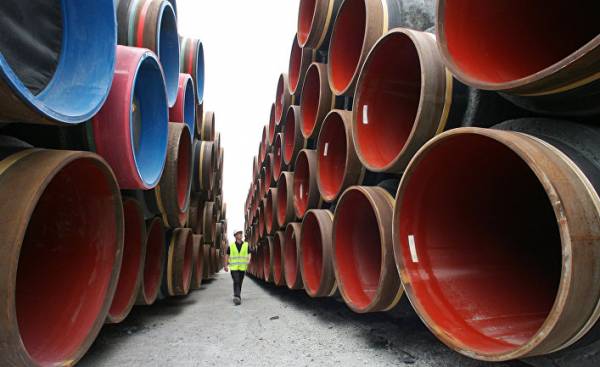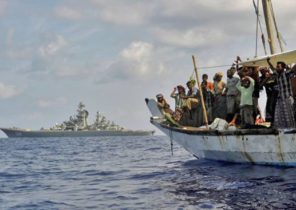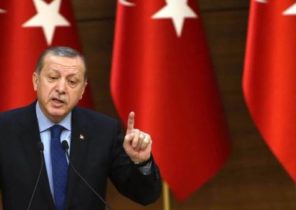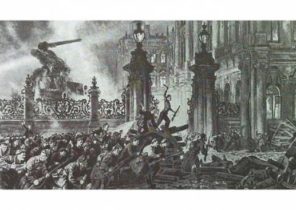
Since 2013, the Russian state gas company Gazprom has plans of expanding the Baltic pipeline “Nord stream” from Russia to Germany — in cooperation with such European companies as Wintershall, subsidiary of BASF, or firm Royal Dutch Shell.
In 2018, to begin construction work, but the resistance to this project is very large. The U.S. Senate specifically calls the “Nord stream — 2” in the new sanctions law, Poland and the European Commission also have a resistance to this project.
From a legal point of view, the German position is well protected, says Kirsten Westphal (Westphal Kirsten), expert on energy issues of the Foundation “Science and politics”. Politically, however, it would be smarter if the Federal government tried to find a compromise with the European critics of this project, also with the aim of uniting the ranks in the face of the United States. This decision of the Senate “can be a calculation using higher energy prices to reduce German exports higher than imports,” Westphal cautioned.
SPIEGEL ONLINE: the US Senate adopted the law on sanctions, in which the “Nord stream — 2” is mentioned specifically. The United States will, under this law, “continue to speak out against the pipeline “Nord stream -2″, because of the harmful consequences of this project for the energy security of the EU”. What is behind this step?
Kirsten Westphal: the Draft law is above all vnutripsihicheskoy motivated. The idea was to rein in President Donald trump. He is already under heavy pressure, now he has even less leeway to accommodate Russian interests. I am concerned that this decision of the Senate sanctions against Russia linked to sanctions against Iran. Penalties will also apply to European firms, i.e. firms from countries cooperating with the United States. In addition, there had been very Frank about jobs in the U.S. and about American economic interests.
Is this just an empty phrase because the slogan “America first” is just now very popular?
— Yes and no. Referring to this slogan trump, the Senate supports the President’s policy. “America first” is one story. Along with this, there is a perception that we are talking about a net benefit and on their own profit maximization, not about that. to attempt to reconcile the interests of such long-time partners like Germany. This would continue to exacerbate economic conflict with Germany. I fear that the price gap between cheaper energy prices in the U.S. and higher in Europe will grow even more. The German excess of exports over imports for the United States as a thorn in the eye.
— What is the common trade debate, with the Baltic gas pipeline?
— At the moment, the Russian natural gas and liquefied natural gas (LNG) compete for parts of markets in Europe, and we’re winning. If Germany would have been forced to import liquefied natural gas from the United States, the balance would shift in favor of the United States. This could be the calculation to slow down the German excess of exports over imports. Also, the US is increasingly using its gas exports as an instrument of foreign and security policy.
— Can the US in the coming years to really develop to the level such an important exporter of liquefied natural gas (LNG)?
— Americans will become an important seller on the level of other major exporters, such as Qatar and Australia. The government is encouraging the construction of new export terminals, as well as the development of new production projects on the principle of “drill, baby, drill” (“drill baby, drill”). Because environmental regulations the White house has lowered.
— Why also in the Senate such a broad majority supported the sanctions law?
— Anti-Russian sanctions and export pipelines such as Nord stream, are mentioned in the law, the name of which we are talking, actually, about Iran. It was a classic compromise: Republicans wanted to send a signal against Iran, and the Democrats against Russia.
— What is the position in this matter, the President of the United States?
Will be interesting to watch this. The first indication of this can give the plans to his visits. Before the G20 summit he will visit Poland, where we will see what the President will say USA on the “Nord stream − 2”.
— The Polish government is spearheading the protests in Europe against the “Nord stream — 2”. Warsaw warns that in case of political conflict, Russia could shut off Europe’s gas supply.
It is an incredible scenario. I don’t see any situation when Russian gas was used as an effective weapon. Now in Europe we have a well stocked market in the coming years, we will have more liquefied natural gas. If Gazprom stopped deliveries, then in our possession would be sufficient capacity to import LNG. Over the past ten years the gas market has changed. Because of the abundance of different sources of gas is not more political leverage. I don’t see any vulnerability.
— One argument of the Polish government States that Russia could, in case of conflict, to continue to supply through the Nord stream and Western Europe, and Poland and other Eastern European States to isolate.
— Germany needs to take seriously the concerns of the poles, but only as long as it really is in fact justified. It is for this reason in the past the EU has also funded the construction in Poland of a terminal for liquefied gas, thereby creating the infrastructure through which the poles could be supplied with liquefied natural gas by sea. However, Poland has serious self-interests, and it should be an energy policy. So, for example, Baltic Pipe should deliver gas from Norway through Denmark to Poland. But it is more expensive than Russian gas, the state gas company PGNIG is afraid of this competition.
— Why Norwegian gas should be more expensive?
— Large gas fields in Norway, production is slowly declining. Norwegian gas becomes smaller, and for the development of new gas fields requires large investments. Russia, by contrast, there are large already developed gas fields. It is impossible to forget also and about their own foreign policy interests of Warsaw.
— What are they?
For government in Warsaw on the “Nord stream — 2” is also a kind of political resource in foreign policy. The resistance to this pipeline project for Poland are the States of the Visegrad group, i.e. Slovakia and Hungary. Conservative government in Warsaw uses this opportunity to underline with the US interests.
— Poland and Ukraine fear that in the future will lose an important transit fees if Russia will supply Western and Central Europe through the “Nord stream”, and not by the existing pipelines through Eastern Europe.
— On the one hand, both countries emphasize that they would like better today than tomorrow to completely abandon Russian gas for its own needs. However, at the same time they insist on maintaining the transit of Russian gas through their territory. This is a bit ironic.
— The expansion of the Baltic pipeline, Gazprom’s share on the German market could grow to 60%. It’s a serious addiction.
— Gazprom may try to capitalize on their strong position in the market. Therefore, it is important to monitor these gas markets and trade on the trading floors, which are called hubs. German companies have, for example, to check whether manipulate prices in certain hubs. But the agencies responsible for monitoring the markets, there are already good tools that if necessary can be even tougher.
The European Commission also refers to the number of critics of this project. What is it about the conflict between Berlin and Brussels?
The European Commission believes that the pipeline should be subject to the laws of the EU internal market. In this case we are talking primarily about the so-called “Third energy package”: under these rules, a network of pipelines must be separated from the vertically integrated gas firms, that is separated from the production, import and sale. The German government, in contrast, believes that Nord stream is not subject to these rules, as we are talking about offshore pipeline, i.e. the pipeline outside the EU via the Baltic sea coming on the European market. In this EU legislation there is no indication. In addition, the German government indicates that for the “Nord stream — 2” was not used by any official means and that it is a purely commercial project.
And who is right?
In legal terms, this argument of the German government accurate and protected. However, the implementation of the “Nord stream — 2” is interpreted as the German-Russian self move, even if it also involved firms from other European countries and has already started the process of obtaining building permits in the countries of the Baltic sea. Therefore, for the government of Germany “Nord stream — 2” and is associated with significant political costs in the EU. Resistance to the project is really big. For the government of Germany is a dilemma: it considered that it was right, but still must decide whether to join a political process of negotiation with partners. This is the risk that the project will fail — although in legal terms really says nothing against the project and it is appropriate for all economic calculations.
— Whether the aggressive foreign policy of Russia the reason that the resistance so much?
— Yes, of course, “Nord stream — 2” has a politically very wrong time and complicating the efforts of the EU on Ukraine. However, the “Nord stream — 2” was initiated by the firms. Proponents of Nord stream argue that gas relations are a stabilizing element in relations between Europe and Russia.
— In what sense?
— Gazprom supplies today, many natural gas to Europe than ever before. Despite continuing in 2014, the security crisis between Russia and the West have no energy crisis. Russia has its own interest in stable supplies, the state budget depends on revenues from gas exports. Opponents of the “Nord stream”, by contrast, argue that to reduce Russian influence, we have to reduce this import.
— How are these differences in Russia?
— Russian feel — and not without reason, that the EU has certain rules applies only in relation to Russia or projects of Gazprom. This is not conducive to the discharge of security.







